A Doris Day Baseball Threesome, Part 2
To reiterate:
The last thing I want to do is slut-shame America’s sweetheart, Doris Day.
But, depending on whose story you cotton on to, Day had an extra-marital relationship with Dodger legend Maury Wills in the fall of 1962, right after he won the National League MVP.
Wait. What?
That was my reaction, too. A deep dive was required. It’s what we do here at TTSS. Biographies were bought. And read. Or skimmed through to the good parts.
Every attempt will be made to keep this as un-salacious as possible, but we’re talking about Doris Day here. Her precisely cultivated on-screen identity was built on her virginal status, as subtext, or just plain ol’ text, in almost every film.
At the height of the Doris Day-Maury Wills rumors, she was coming off The Man Who Knew Too Much (1956) with Jimmy Stewart, The Pajama Game (1957), Pillow Talk (1959) with Rock Hudson, and the aforementioned That Touch of Mink (1962) with Cary Grant. Her chaste persona persisted in 1962, despite three marriages, a 21-year-old son, and turning 40.
Between 1959 and 1962, Maury Wills went from a 27-year-old journeyman minor leaguer, to an All-Star shortstop with the Dodgers, to a record-breaking super-star. 1962 was the year Wills obliterated Ty Cobb’s stolen base record that had stood since 1915. He stole 104 bags (with only 13 caught-stealing!) and won the NL MVP.
As with so many award results that can be examined retrospectively, Wills was not the most deserving player that year. Willie Mays doubled his WAR total. He didn’t even lead his own team in Fangraphs War. But with an All-Star Game MVP, a second Gold Glove at shortstop (for the high profile Dodgers), and that record breaking headline, he had the narrative, as they say. And narrative is what we’re here for, be it via eye-test, folklore, or data sets. All are welcome and valid.
By any measure, Doris Day and Maury Wills were two of the most famous people in America.
Day was a highly visible regular at the brand new Dodger Stadium in 1962, sitting in box seats next to the dugout. With her celebrity, becoming acquainted with baseball stars was not surprising.
With news of pending divorces, both Day and Wills were making the gossip columns in the fall of 1962 and into 1963. The movie tabloids relished their innuendos.
“Doris Day and [husband] Marty Melcher are having more dissension than Leo Durocher has with an umpire.”
-Motion Picture, February, 1963
“It’s rumored that the marital troubles are rooted in Doris’ sudden addiction to baseball. Understand she’s prone to gift-giving she enjoys the game so much.”
-Movie Life, February, 1963
“Last December the papers hinted that Doris’ third marriage might be called out on a foul after almost twelve years.”
- Movie Mirror, March, 1963
Modern Screen called it out plain as day (ha, sorry) with the headline, “Is Doris Day in love with a Dodger?” Screen Stories answered the question, citing rumors, “that Doris Day, a staunch fan of the Dodgers’ baseball team, would go into independent production with Dodgers star Maury Wills.”
In her memoir, Her Own Story, Day denies that Wills was anything more than an acquaintance, “The only times I saw Maury were at the games, at an occasional function given by the team’s owner, Walter O’Malley, and at parties…”
Day’s long-time personal assistant Barbara Flicker said, “I honestly couldn’t believe it had happened because I knew how busy she was. I don’t know when she would have had the time… I was with her day and night… Unless she got up at two o’clock in the morning until three or four. I just can’t figure out when or how they physically could’ve done it.” (From Doris Day, The Untold Story of the Girl Next Door, by David Kaufman).
Maury Wills tells a different, if questionable, account in his book, On The Run: The Never Dull and Often Shocking Life of Maury Wills.
The first sentence of the book’s prologue states, “This isn’t a kiss-and-tell book.” By page 27, he already telling the kissing, “I was so alone. Sometimes I’d call Doris Day just to talk to her at three or four in the morning. She’d try to tell me how to fall asleep. Maybe I’d ask her to come over and sometimes she would. Then we’d make love.”
Maury, you are a blabbermouth, but it appears our timelines are matching up.
Later in the book, Wills gushes, “Doris Day is a lovely lady and we did see each other. And, yes, we were lovers. I was young and still inexperienced. Baseball was the only thing I knew… She’s a sweet person. Not one negative word or thought ever came out of her mind… I didn’t know what love was all about. The only love affair I’d had was with baseball. I’d have loved to have gone to dinner, but we couldn’t go out in public… We had a mutual need for one another. We were in love - as I understood it at the time. I was so much in love with baseball. As much love as I had, it was extended to her, but it was too much for me. I couldn’t handle it…”
That’s real sweet, until he gets to this part, “We made an agreement that regardless of what happened, we’d always deny it. I’ve lived up to that all these years.” He then blames teammate John Roseboro for outing the affair in his autobiography (Roseboro doesn’t) and writes three more pages about the affair.
Pick your He said / She said and believe what you will. I’m choosing to think they had a real, loving relationship that should have flourished. I could use a coded phrase like “different times” or “social pressure”, but it was out-and-out racism that made their relationship closeted and ultimately doomed.
In the book The Last Innocents by Michael Leahy, Dodgers executive Buzzy Bavasi “made it clear that the club wouldn’t look kindly on the public relations nightmare likely to ensue if white fans leaned that one the team’s [black] star player was dating America’s girl-next-door.” The message from the Dodgers was clear: Wills could continue seeing Day, but not without repercussions. He ended their relationship.
If we’re drawing parallels to today, let’s start with this one: a corporation bowing to the least common denominator of public bigotry, preventing women and people of color from simple happiness. The more things change, the more they stay the same.
Back to the Doris Day baseball flick On Moonlight Bay. In one almost extraneous scene, Day/Marjorie’s Aunt Martha shows up for brother Wesley’s 12th birthday with a huge box of baked goods. She doles out zingers along with the cookies. Let’s parse out her aphorisms in context of today’s theme.
Aunt Martha declares, “No man believes in marriage. Until a woman traps him into it.”
Men (and woman) are perhaps not innately and universally monogamous. They have to be tricked into it. Had Day and Wills not been stuck in unhappy marriages they thought impossible to escape, they would have been able to be together.
After giving Wesley a Swiss-Army style pocket knife, Aunt Martha posits, “I suppose he’ll do something horrible with it. I’d be disappointed if he didn’t.”
I’m with you Martha. Don’t be afraid of the sharp edge of adventure, especially when you’re young. Even if that corkscrew goes right through your foot. Even if you lose a finger.
Finally Aunt Martha turns to Wesley, who is debating finishing off the last cookie, “Go ahead and stuff yourself. You’re 12 years old today and you ought to be happy if nothing else. It’s taken over nineteen hundred years of Christianity and some hundreds of thousand of years of other things to produce you. And there you sit.”
Wesley, confused, “Ma’am?”
Aunt Martha, “It’ll be your turn to struggle and muss things up for the betterment of posterity soon enough. Eat your cookie.”
That’s some harsh reality, Aunt Martha.
Doris Day and Maury Wills got to eat their cookies for a time (I tried to not be salacious, I really tried). It didn’t work out. Society, circumstance, whatever. They still got a glimpse of happiness. That’s always worth it.
Day carried those memories with her without talking about it, at least publicly. Wills did the same and blabbed to sell some books. I’m not mad at either of them. I’m glad I know the story, but I really wish that story was happier for them.
Doris Day, neé Doris Mary Kappelhoff, passed away in 2019 at age 97. A. O. Scott’s remembrance in the NY Times is the best of the obits. He writes about her ability to subvert her viginal persona from within her romantic comedies, especially Pillow Talk (1959), Lover Come Back (1961), and Teacher’s Pet (1958).
Every line sounds like a double-entendre. Every encounter is full of implication and innuendo, every character a collection of mixed signals. These movies are naughty beyond imagining, and as clean as a whistle… Day is the key to it all, because her presence simultaneously upholds the pretense of virtuous normality and utterly transgresses it. She is a walking semiotic riot with a pert nose and a winning smile, keeper and scrambler of a whole book of social norms and cultural codes.
Maurice Morning Wills died at 89 in September, 2022. The Dodgers wore a patch on their uniformes with his #30 for the remained of that season. His tumultuous life will be covered in the part 3 of our Day-Wills threesome. Did I mention he was a banjo player?

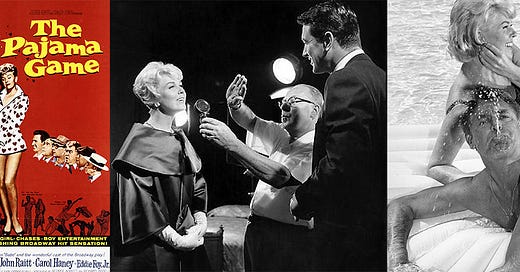



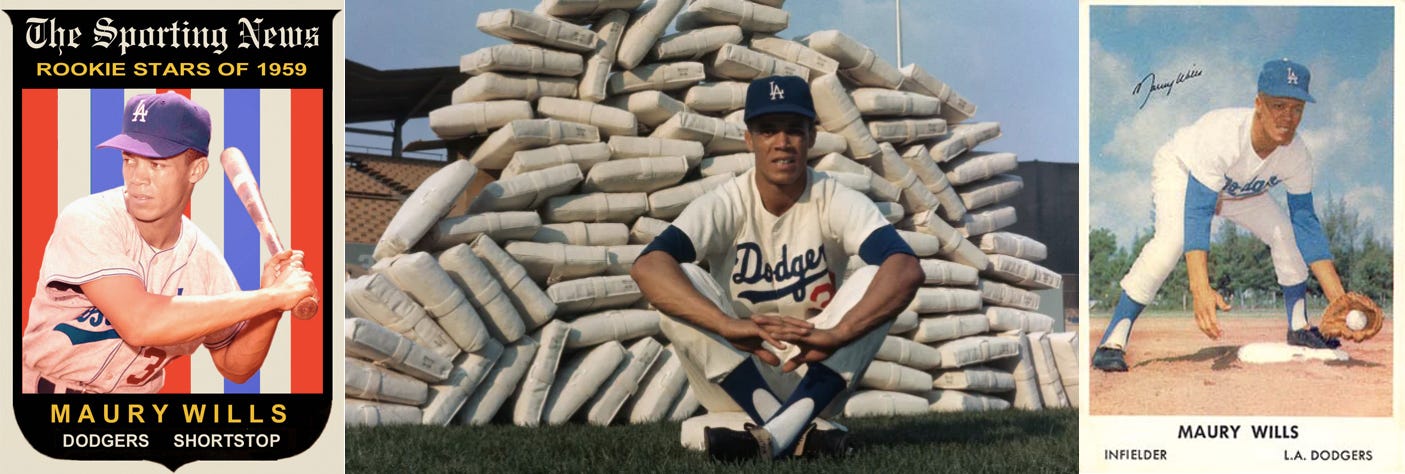

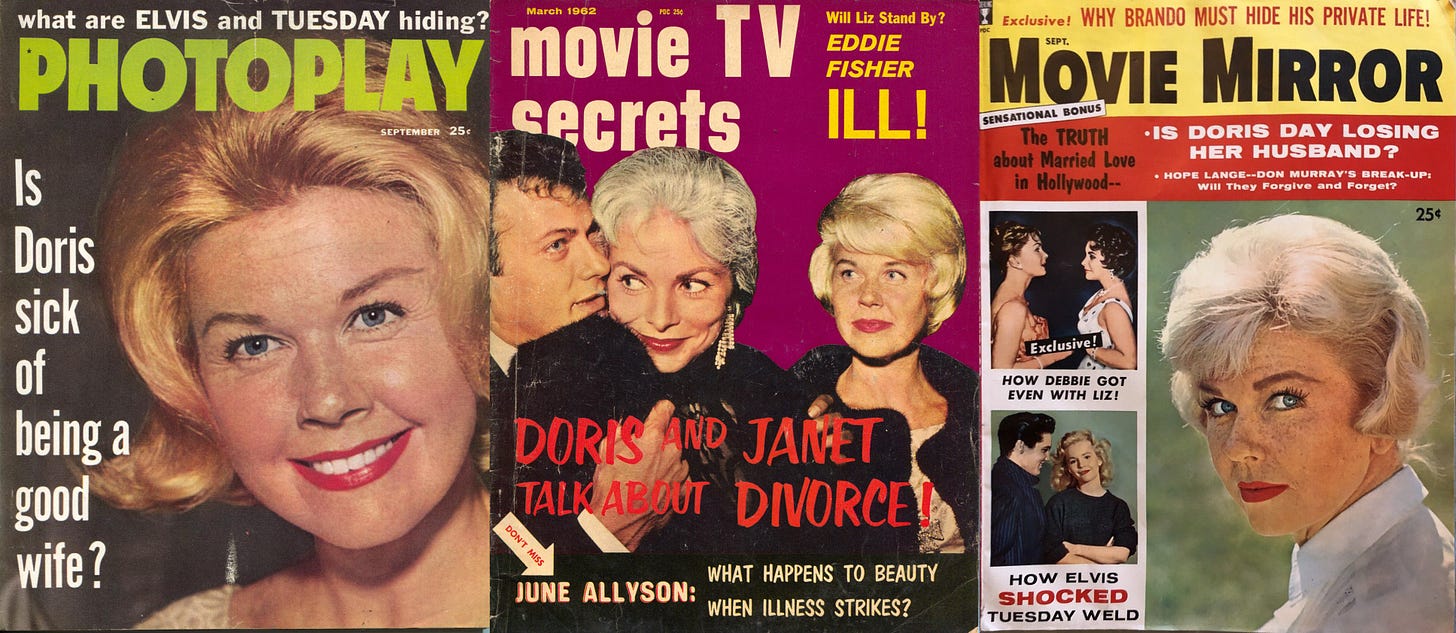
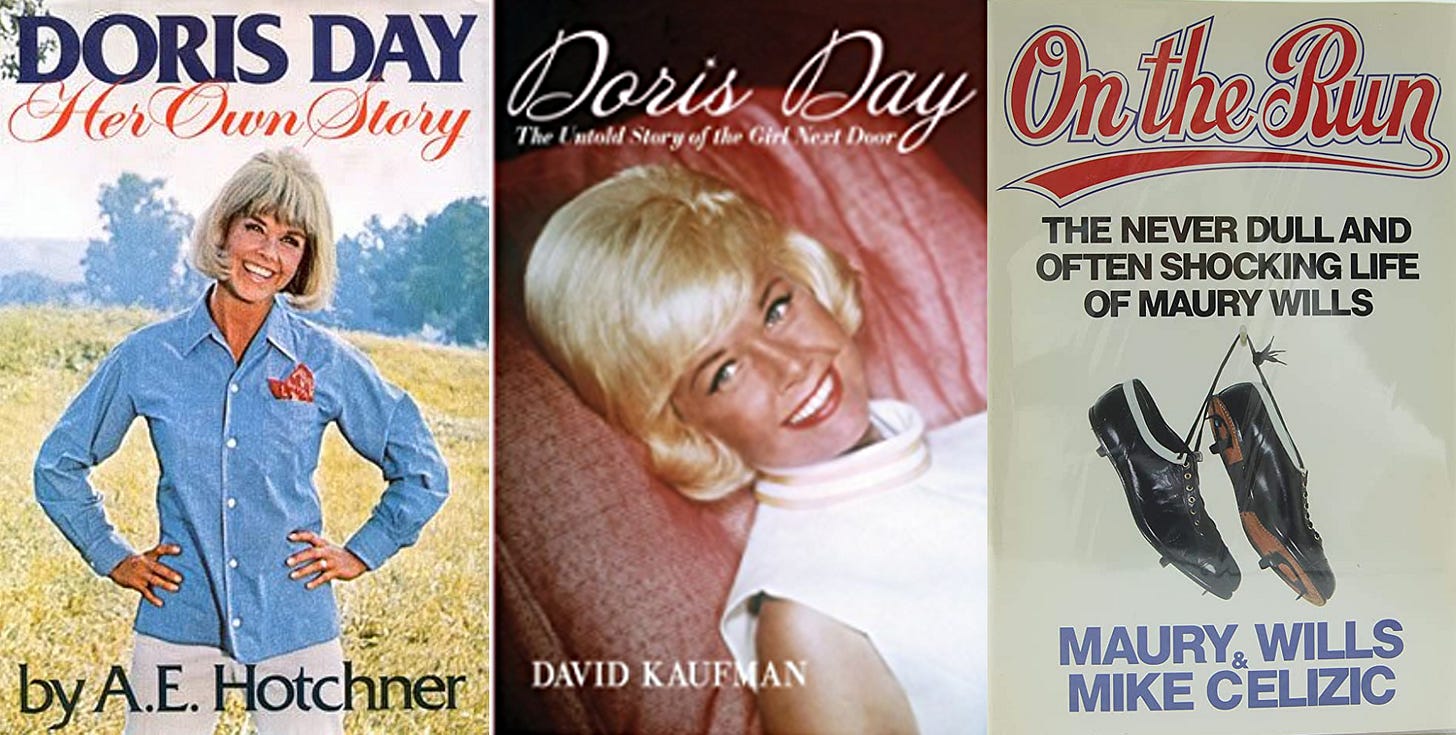
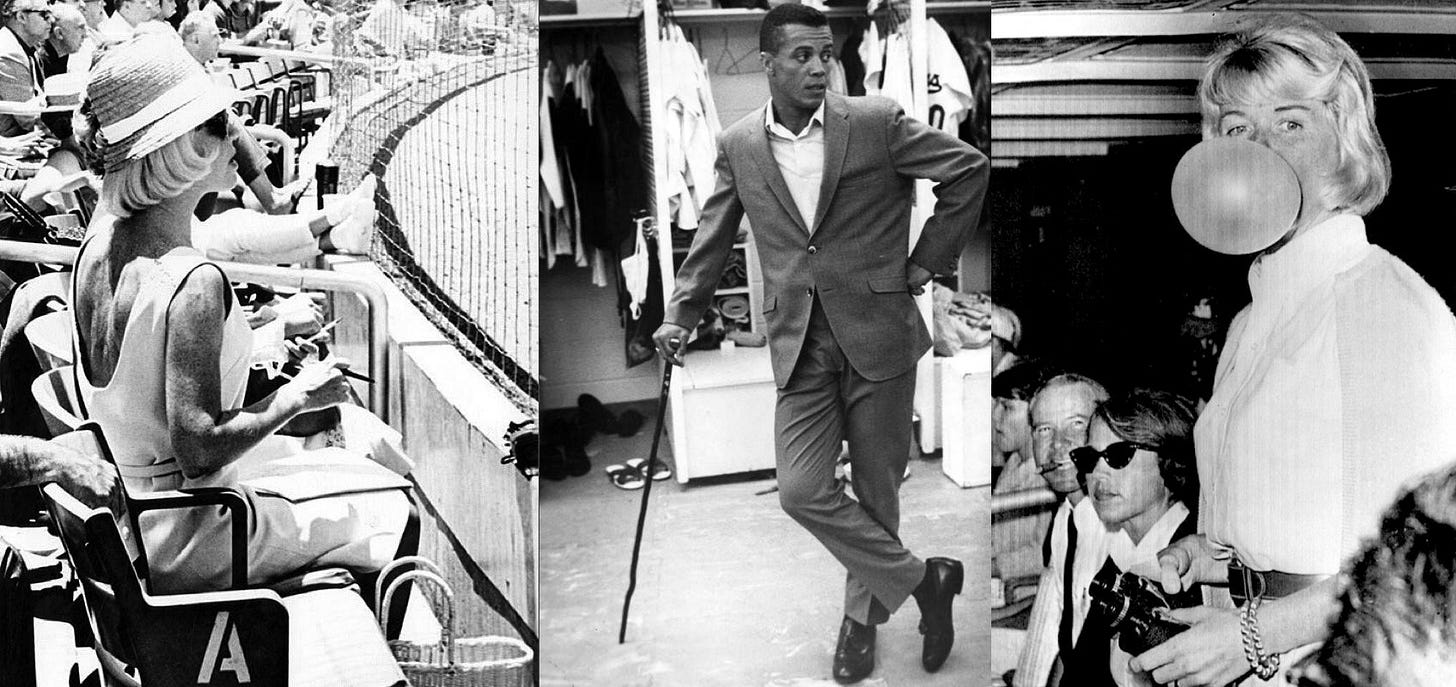

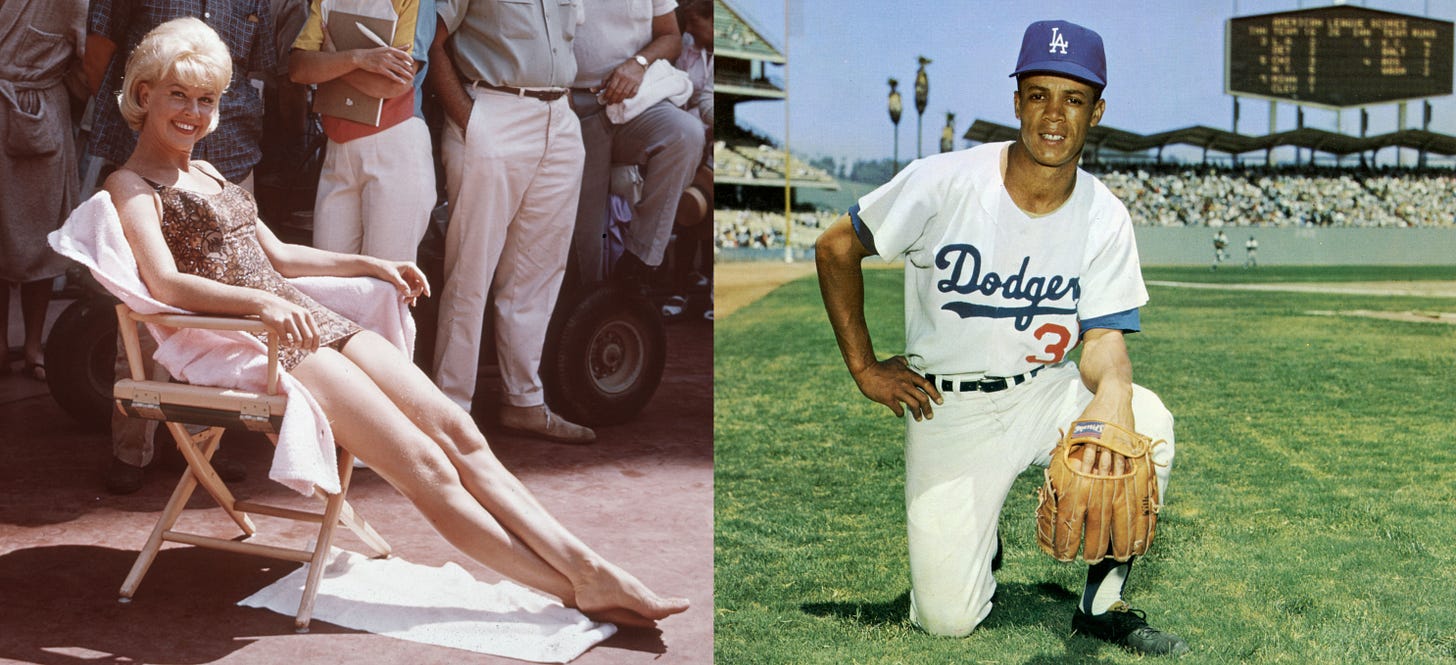
Great piece Jay, and worthy of a broader, national audience. Those tabloid quotes are so great. The gossip columnists of old had skills!
If she instead had an affair with (my) GOAT Willie Mays, they might've had a son named, Willie "Say Hey" Mays-Day.